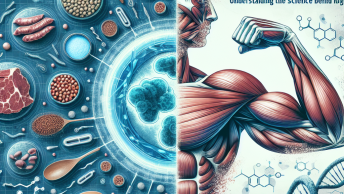When it comes to health and fitness, two terms often get thrown around interchangeably: fat loss and weight loss. While they may seem similar, these concepts are very different in terms of what they encompass and the methods used to achieve them. Here’s a comprehensive guide to help you understand the key differences and the important implications these distinctions have for your health goals.
1. Defining Weight Loss and Fat Loss
Weight Loss refers to the overall decrease in body weight. This can include losing water weight, muscle, and fat. Therefore, a weight loss strategy may not target fat specifically and can sometimes lead to muscle loss, which is generally not desirable for overall health.
Fat Loss, on the other hand, specifically refers to the reduction of adipose tissue or body fat. This is a more targeted and beneficial goal, as maintaining muscle mass while reducing body fat contributes to better overall health, improved metabolism, and optimal physical performance.
2. The Scale Isn’t Always the Best Indicator
Many people rely on the scale to track their progress, but this can be misleading. Weight can fluctuate daily due to various factors including water retention, digestion, and even menstruation cycles. A better approach is to measure body composition through methods like skinfold calipers or bioelectrical impedance analysis. Another effective approach involves taking measurements (waist, hip, etc.) or using progress photos to get a clearer picture of fat loss versus weight loss.
3. Muscle vs. Fat: Understanding Composition
Muscle is denser than fat, meaning that a person can weigh the same but actually have different body compositions. For example, a person who has lost fat but gained muscle might see little change on the scale, yet their body will look significantly different and typically be healthier. This is why focusing on fat loss, rather than weight loss, is preferable for improving health and aesthetics.
4. The Role of Diet in Fat Loss vs. Weight Loss
Diet plays a crucial role in both fat loss and weight loss, but the strategic approaches can differ:
-
Weight Loss may be approached through calorie restriction alone, where the primary focus is simply reducing caloric intake.
- Fat Loss, however, requires a more nuanced approach that includes understanding macronutrients (proteins, fats, and carbohydrates) and focusing on whole foods. A diet rich in protein can help maintain muscle mass while promoting fat loss. To dive deeper into effective dietary strategies for fat loss, [Click Here to learn more].
5. The Importance of Exercise
Exercise is fundamental for both fat loss and weight loss, but the type and intensity of workouts can differ:
-
Weight Loss often involves aerobic exercises like running or cycling to burn calories.
- Fat Loss, in contrast, should prioritize strength training, which helps build muscle. Higher muscle mass can increase metabolic rate (the number of calories burned at rest), facilitating greater fat loss over time. Adding high-intensity interval training (HIIT) can also be effective for fat loss by increasing calorie expenditure and improving metabolic health.
6. Hormonal Responses
Both fat loss and weight loss can influence hormone levels in the body, but they do so differently. Stress, sleep, and eating patterns play significant roles:
-
Stress can trigger cortisol release, promoting fat storage, especially in the abdominal area. Thus, managing stress is crucial for fat-loss goals.
- Sleep deprivation can lead to hormonal imbalances, affecting hunger hormones like ghrelin and leptin, which can complicate weight loss efforts. Prioritizing quality sleep is vital for both fat loss and weight loss strategies.
7. Sustainable Lifestyle Changes
While quick fixes can provide temporary weight loss, sustainable lifestyle changes are essential for long-term fat loss success:
-
Weight loss diets often involve drastic measures that are hard to maintain. In contrast, fat loss should focus on incorporating balanced nutrition, regular exercise, and healthy lifestyle habits.
- Mindfulness and awareness about eating habits can foster a more considerate approach to food, encouraging choices that align with long-term health goals.
8. Understanding Metabolism
Metabolism is the rate at which our bodies convert food into energy. Weight loss can slow down metabolism, especially if muscle is lost along with fat. In contrast, maintaining or increasing muscle mass during fat loss can help keep metabolism robust.
9. The Psychological Aspect
The psychological approaches to weight loss vs. fat loss can differ significantly.
-
Weight Loss might focus on numbers, leading to stress and anxiety associated with the scale.
- Fat Loss promotes a healthier lifestyle and encourages a positive relationship with food and body image. Focusing on how you feel, both physically and mentally, can lead to better adherence to healthy habits.
10. The Bottom Line: Goals Matter
Understanding the distinction between fat loss and weight loss is crucial. If your goal is to improve your overall health and fitness, targeting fat loss is far more beneficial than focusing solely on losing weight. Setting clear, specific goals along with a comprehensive plan that includes nutrition, exercise, and lifestyle modifications will yield the best results.
For anyone looking to embark on a transformation journey, understanding these differences will help you choose the right path tailored to your personal goals. As you progress, don’t be discouraged by fluctuations on the scale; focus on how your body feels and looks, and remember that the ultimate goal is to enhance your health and well-being.
To kickstart your journey and expand your knowledge on effective fat loss strategies, [Click Here to learn more]. Stay committed, and success will follow!
Conclusion
In the quest for a healthier lifestyle, it’s essential to differentiate between fat loss and weight loss. By educating yourself on the physiological processes involved, employing practical strategies for success, and maintaining a positive mindset, you can achieve your goals. Embrace the journey and remember: it’s not just about the numbers on the scale, but about achieving a healthier, happier you!






